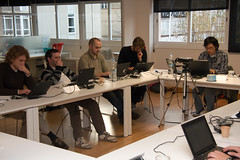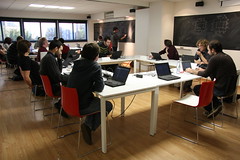Overview
Hackfests have become an essential activity in 2011 since they were introduced in 2008.
A hackfest is a short activity during the development cycle that helps to accelerate the coordination and development of specific teams and/or tasks. Hackfests also help us to explore new areas of development, keep the community vibrant behind a common goal.
Year |
# Hackfests |
# Attendants |
Participants range [min, max] |
2008 |
03 |
55 |
[05, 32] |
2009 |
06 |
57 |
[04, 13] |
2010 |
11 |
137 |
[06, 33] |
2011 |
11 |
109 |
[03, 21] |
|
Hackfests Summary
The following table shows the hackfests -in reverse order- from September 2010 to December 2011:
Event |
Location |
Date |
Attendants |
Notes |
2010 (September to December) |
||||
Accessibility |
Seville, Spain |
Oct 09-13 |
21 |
|
GTK+ |
A Coruña, Spain |
Oct 18-22 |
15 |
|
Snowy |
Boston, USA |
Nov 05-08 |
06 |
|
Developer Tools and Documentation |
Berlin, Germany |
Dec 02-05 |
12 |
|
WebKitGTK+ |
Coruña, Spain |
Dec 05-12 |
11 |
|
2011 |
||||
PyGOBject |
Prague, Czech Republic |
Jan 17-21 |
09 |
|
GNOME+Mono |
Brussels, Belgium |
Feb 07-11 |
08 |
|
Sysadmin |
Los Angeles, US |
Feb 25-27 |
03 |
|
Documentation |
Toronto, Canada |
Mar 17-22 |
08 |
|
GNOME 3 |
Bangalore, India |
Mar 30-Apr 03 |
15 |
Release Team/Coordination. Part of GNOME.Asia |
Accessibility |
A Coruña, Spain |
May 09-13 |
11 |
|
Documentation |
Cincinnati, US |
Jun 06-08 |
06 |
Part of Open Help conference |
IM, Contacts and Social |
Cambridge, England |
June 13-17 |
16 |
|
GObject Introspection |
Berlin, Germany |
Aug 10-15 |
14 |
|
GStreamer |
Prague, Czech Republic |
Oct 24-25 |
?? |
|
WebKitGTK+ |
A Coruña, Spain |
Nov 29-Dec 05 |
19 |
|
Hackfests Details
|
WebKitGTK+
This is becoming an annual hackfest celebrated in December of each year. WebKitGTK+ is the HTML engine used in GNOME Web Browser (Epiphany) as well in many other applications that needs an embedded HTML engine (e.g. instant messaging). WebKitGTK+ development has raised the requirements of the components it depends on, such as libsoup. Indirectly, WebKitGTK+ improves the user and developer experience of other applications that depends on those components. All in all, WebKitGTK+ can be used from from mobile to complex desktop applications.
The hackfests in 2010 and 2011 we focused on (non-comprehensive list):
- Planning sessions to set the directions of both WebKitGTK+ and the GNOME Web Browser
- Web Browser redesign
Accessibility support for WebKit2
- Accelerated compositing
- Mobile API
- Touch API
JavaScriptCore (V8) improvements
- Improved HTML5 video support (via GStreamer integration?)
- Performance and stability improvements
- WebKitGTK+ cache integration into libsoup, so other applications can benefit from it
- Build infrastructure
- JHbuild-able
- Build bots
Sponsors:
- Direct sponsors: Igalia and Collabora
- Indirect sponsors: Motorola and Red Hat (for sending their developers and paying their flights to the hackfest)
Sample pictures:
![]() More pictures of both hackfests can be found in Mario's set for 2010, Mario's set for 2011 and Nayan's set for 2011.
More pictures of both hackfests can be found in Mario's set for 2010, Mario's set for 2011 and Nayan's set for 2011.
Documentation
![]() Work in progress. should we include developer tools here?
Work in progress. should we include developer tools here?
Berlin, December 2010. Toronto, March 2011. Cincinnati, Ohio, USA, June 2011. Brno, Czech Republic, February, 2012.
The hackfest in Cincinnati was held right after The Open Help Conference, a gathering of various people working on Free/Open Source Software documentation. The conference server as warm up for the hackfest and let the GNOME documentation team to engage with other fellows. The main goal was to start planning the documentation for GNOME 3.2.
- User help
- Complete the new desktop help for Gnome 3.0
- Complete or review help for core Gnome applications
- Time permitting, add more content to the new Style Guide - --- Cincinnati
- Evaluate the desktop help for missing topic areas, checking forums/lists/etc for common questions and problems.
- Review the planned new functionality for 3.2 and stub new topic groups.
- Review existing Mallard application help. Make a plan for each to update them for 3.2.
- Triage old application manuals and decide which ones will be redone as topics in 3.2.
- Do topic planning for any planned new Mallard documents. - --- Brno
- Update gnome-help for new 3.4 features
- network printer and print pages == a priority.
- Update Empathy help
- Write new help for more apps
- For apps, should we get rid of introduction.page and place the intro on the index.page?
- We need more templates in yelp-tools: guide?, index?, tip?, problem?, question?... etc.
update this page: https://live.gnome.org/DocumentationProject/Tasks/DesktopHelp
update this page: http://live.gnome.org/DocumentationProject/Join (especially references to docbook)
update or delete: https://live.gnome.org/DocumentationProject/Planning
- Discuss possible changes to intro help page to make it more friendly to touch interfaces
- Mobile-friendly XSLT style sheets for Mallard help?
- Discuss style guide / word usage guidelines
- Documentation for developers
- Finish the new Platform Overview.
- Write more tutorials for the new developer demos.
(and Gnome3PortingGuide?)
- Time permitting, review and improve gtk-doc reference (low priority). - --- Brno
- Write new tutorials
- Update and revise the platform overview
- Improve GObject overview
Accessibility
![]() TBD
TBD
San Diego, California, USA, March 2010 Seville, Spain, October 2010 A Coruña, Spain, May 2011 Granada, Spain, November 2011
- Plans for GNOME 3
- Community members are stepping up to take ownership and help out where they can. This includes the following (my apologies if I forgot someone or something — it’s not on purpose!):
Joanie Diggs taking over leadership of Orca as well as continuing to work on WebKitGtk accessibility
- Li Yuan, Nagappan Alagappan, and Mike Gorse joining forces to help with AT-SPI/D-Bus, with Li also helping to figure out other AT-SPI related stuff, such as libgail-gnome and login-helper
- Ke Wang continuing his work with the Java ATK Wrapper as a replacement for the Java Access Bridge for GNOME
- Eitan Isaacson working on a new way to represent the AccessX status, helping with Caribou, and helping with Accerciser
Bryen Yunashko taking ownership of leading VizAudio to completion
- Ben Konrath continuing his work on Caribou, including incorporating ideas he got from seeing things at CSUN
- Alejandro Piñeiro Iglesias (API) taking leadership for Clutter and GNOME Shell accessibility
Flavio Percoco Premoli continuing work with MouseTrap, including incorporating ideas he got from seeing things at CSUN
- There is a lot more, but it involves people who were not at the hackfest and I will follow up with them
- We decided it was acceptable to not port CSPI to AT-SPI/D-Bus. The biggest impact this will have will be on GOK since GOK relies immensely on CSPI. With the work on Caribou emerging as a potential replacement for GOK, we decided the risk is OK.
- Transitioning from old leadership to new one
- Spread FOSS on accessibility are for real
- GNOME booth at CSUN
Introspection
![]() TBD. PyGObject and GObject Introspection.
TBD. PyGObject and GObject Introspection.
Cambridge, MA, USA, April 2010 Prague, Czech Republic, January 2011 Berlin, Germany, August 2011
- The mission is to keep Python as a great language in which to code in the GNOME platform. The two concrete goals on which the hackfest will focus are porting PyGObject to Python 3.x and giving a push to PyGI (gobject-introspection bindings).
- - 2010
- Implement vfuncs and callback support in PyGI
- Move the non-python-specific tests into gobject-introspection
- Integrate Cairo into PyGI
- Add Tomeu's pygi-convert.sh translation script to ease PyGTK to PyGI migration
- Ensure that functions are thread-safe (use the GIL when needed) - 2011, 1
- Get a deeper understanding of what parts are important to GNOME Python and focus on getting those bits finished
- Identify API in Gtk+ that is unwrappable and get it fixed before the freeze
- Work with developers to port their applications
- Get PyGObject into a shippable, stable state
- Figure out our post-GNOME 3.0 goals
- Reduce invocation overhead
- Move overrides to one or more separate modules
- Figure out a way to have private overrides for applications (i.e gedit)
Direct sponsor Prague: Collabora Direct sponsor Berlin: Collabora, Openismus, Nemein
GTK+
![]() TBD. Maybe mixed with Introspection.
TBD. Maybe mixed with Introspection.
Services
![]() TBD. Snowy. Sysadmin.
TBD. Snowy. Sysadmin.
Mono
![]() TBD.
TBD.
IM, Contacts and Social
![]() TBD.
TBD.
GStreamer
![]() TBD.
TBD.


